Opportunities and makings of Philippine smart cities
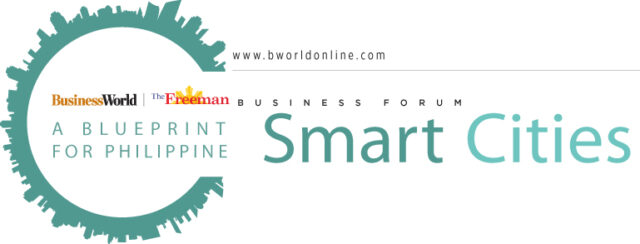
BusinessWorld, The Freeman hold forum tackling ‘smart’ potentials of cities across country
By Chelsey Keith P. Ignacio, Special Features and Content Senior Writer
As urban spaces and population expand, there is a rising need for solutions to address existing challenges with urbanization and to prevent more issues to come along the establishment of cities. And nowadays, advancements in technology are being utilized or integrated into developing existing and upcoming cities to address such issues and transform these urban areas into smart cities.
But smart city development would also stipulate for comprehensive planning to ensure that its innovative solutions do address the issues and enable better urban life. From minding the city’s energy source, sustainability of homes, to inclusivity in transport, drafting “A Blueprint for Philippine Smart Cities” was discussed by experts and leaders from relevant industries during the business forum organized by BusinessWorld and The Freeman last Nov. 10 at Belmont Hotel Mactan in Cebu.
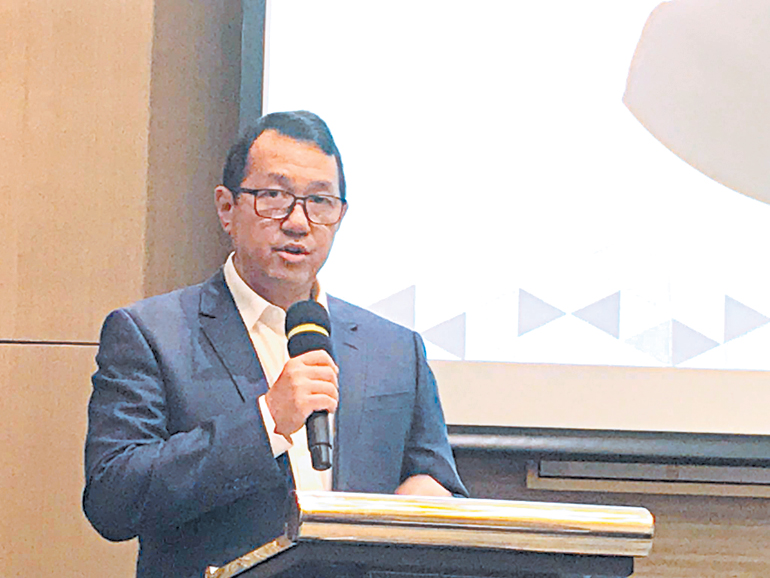
“We all know how a lack of comprehensive urban planning can negatively affect our lives and the environment we live in. In drafting a blueprint for smart cities in the Philippines…we hope to explore opportunities, innovations, and developments that will positively impact our lives and the world we live in,” BusinessWorld and The Freeman President and Chief Executive Officer (CEO) Miguel G. Belmonte said in his welcome remarks.
Opportunities are seen to be found in smart cities, particularly in benefiting people’s lives and the economy.
“When we talk about technologies, we actually have a lot,” Department of Human Settlements and Urban Development (DHSUD) Secretary Jose Rizalino L. Acuzar said. “When brought together, there is a potential of making life more comfortable than ever and sustainable for future generations.”
“For me, that’s the essence of developing smart cities, to bring forward the vision of improving quality of life,” he continued with his keynote on “The Prospect of Smart Cities: From A Real Estate Perspective.”
However, citing The Economist Impact’s Digital Cities Index, Mr. Acuzar pointed out that the Philippines, as a developing country, is lagging behind. Manila placed last in the index, scoring 39.1, which is below the global average of 63.3 and Asia-Pacific’s average score of 59.4. The index looked at 30 cities across the world.
Mr. Acuzar nonetheless shared initiatives planned to develop more homes under the Pambansang Pabahay Para sa Pilipino program, which he said was not only building houses but also targeting township development encompassing amenities, services for housing communities, livelihood, and digital connectivity. It also seeks to develop megacities that will generate opportunities for economic growth.
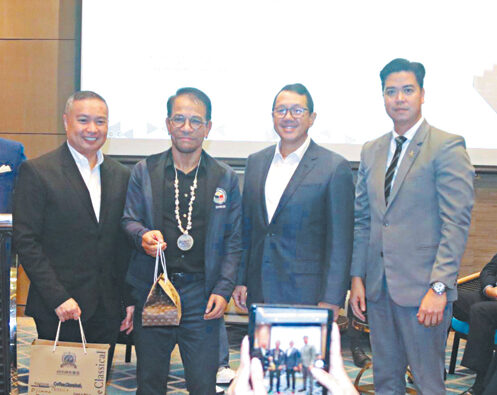
Among the other prospect developments he mentioned was the transit-oriented North-South Development Project. Yet, he noted the need for investment and an active policy environment from both government and business sides.
“We are literally drawing smart cities on a laid canvass. With holistic point of view, we are taking one step at a time, but also minding all angles to connect the dots toward our vision of genuine urban development,” Mr. Acuzar said.
Meanwhile, aside from improving quality of life, smart cities are also seen to support economic competitiveness.
“Technology is transforming the way our cities work in Southeast Asia. This presents a unique opportunity for countries like us to embrace smart city solutions that can boost economic competitiveness and improve our overall quality of life,” Cyel Auza, vice-president for Cebu Operations at Aboitiz InfraCapital Economic Estates, said in her keynote on “Economic Opportunities from Smart Cities.”
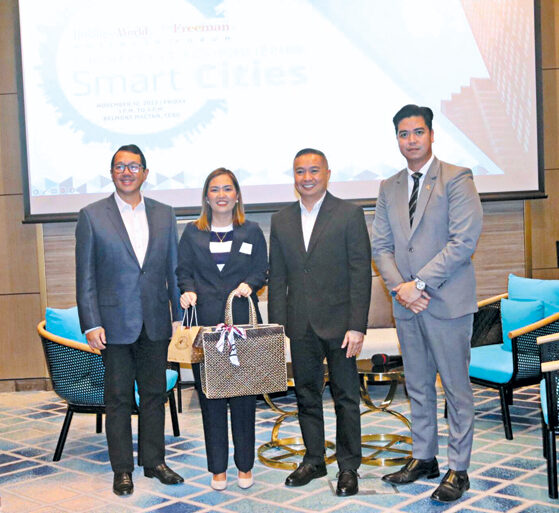
Ms. Auza perceived the capabilities of technologies in smart city solutions to forecast and address risks and uncertainties caused by climate change and cyber threats. Developing smart cities also involves infrastructure and services in the urban space to deal with environmental and social issues.
“The ultimate goal is to find a balance between economic growth, protecting the environment, and enhancing the well-being of our citizens, ensuring a prosperous and harmonious future for our communities,” she said.
As cities seek to become smart, the development would not only hinge on the local government. Kellie Ko, president of the Mandaue Chamber of Commerce and Industry, further underscored the importance of collaborating with the government in developing smart cities during the forum’s first panel discussion themed “The Circuitry of Cities: Innovations powering smart city development”.
“It’s a two-way thing now. A city has to do their part,” Mr. Ko said.
“We don’t wait for the city government to make our city smart. We have to work with with the government to achieve it,” he added.
Mr. Ko also highlighted the value of pursuing smart city development moving forward in terms of competitiveness and livability.
“From the general public and economic perspective, the strive toward smart and resilient cities is really worthwhile. It’s a necessity [that] if we do not do it, we will be uncompetitive and cities will be unlivable. So definitely, that is the future we should strive for,” he said.
Core components
When talking about smart cities, it does not solely revolve around being innovative. Sustainability also makes certain to be embedded in various areas, among which is in property developments in the city.
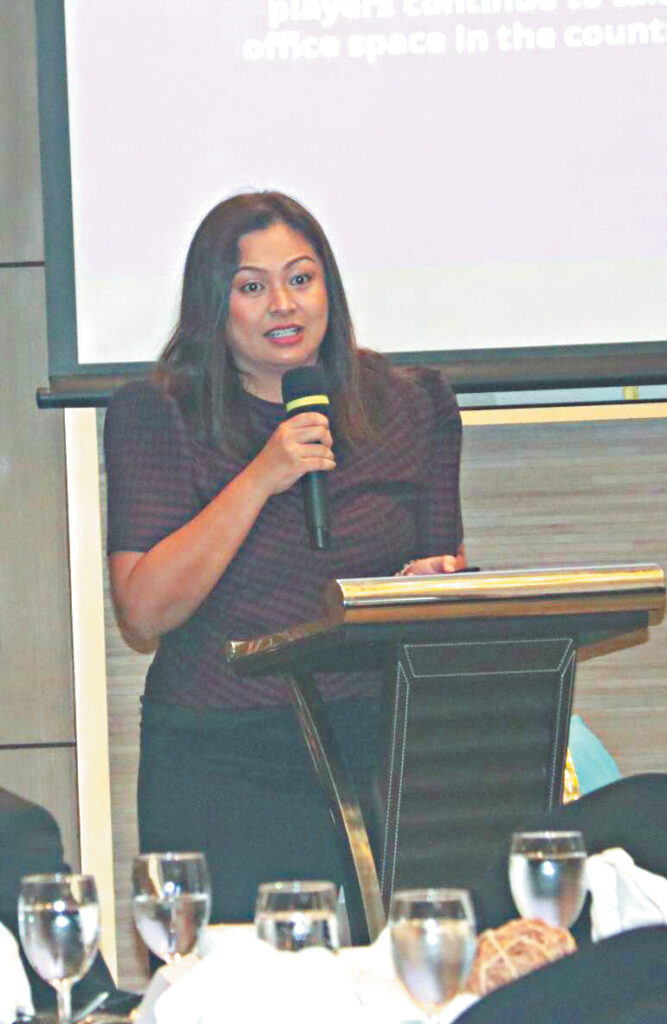
In the real estate sector, Maricris Sarino-Joson, director and head of Office Services – Landlord Representation at Colliers International, gave several recommendations to incorporate diversity, equity, and inclusion (DEI) and environmental, social, and governance (ESG) standards.
“These are very important components if you’re building a community,” she said.
Ms. Sarino-Joson presented property market updates centered on the office sector in starting off the forum’s first panel discussion.
For DEI, some of Ms. Sarino-Joson’s recommendations included, among others, collaborating with locally-based suppliers to reduce carbon footprint; supporting local communities; acknowledging the impact of establishments or institutions on the lower-income group, indigenous people, and people of color; and making adjustments contingent to how these groups are affected.
Meanwhile, some recommended pursuits for ESG involved bringing in sustainable alternatives for a company’s resources, investing in sustainable and higher quality materials; and having green lease in companies, among others.
Broadly looking into masterplanned communities, Joey Bondoc, head of Research Team – Manila at Colliers International, also mentioned that developers should integrate green sustainable features in these projects. At the same time, they should consider leveraging technology advancements, such as the Internet of Things.
“Overall, Internet of Things and other advanced advancements in technology, it’s really important that you integrate these features into the new property department,” Mr. Bondoc said.
“Internet of Things will really play a role in advancing the technologies and the features of these masterplanned communities,” he added.
Powering the city
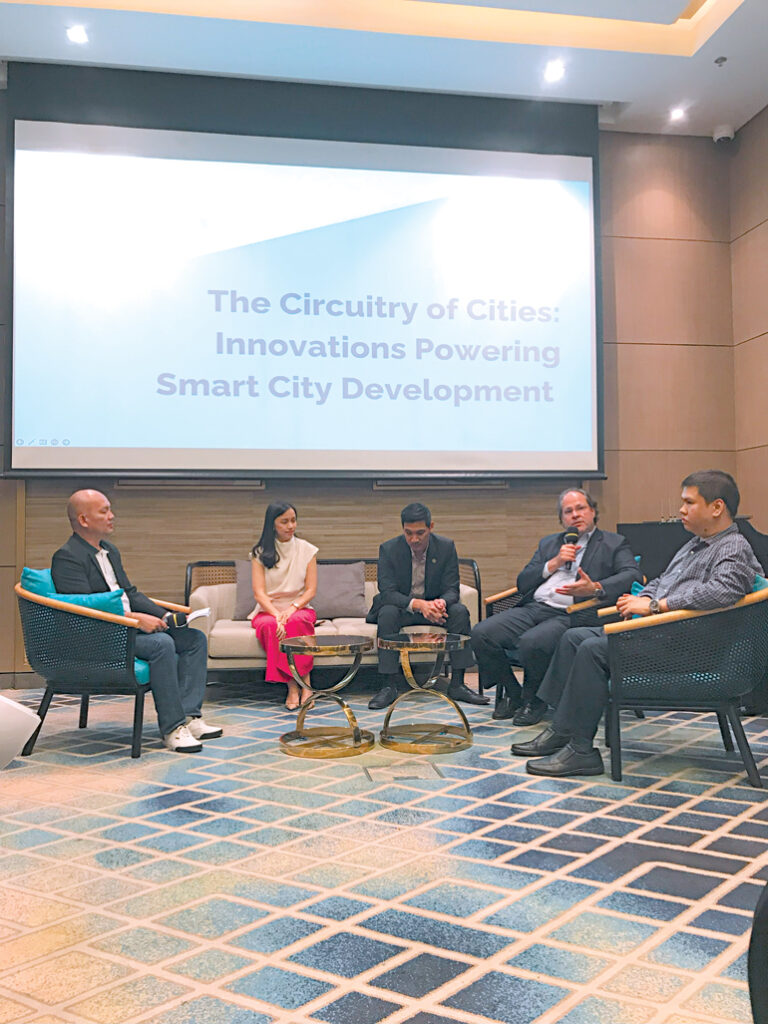
As urban areas are transformed to function with digital technologies, energy is a necessity to power these smart cities.
“Cities are not only centers of culture, education, and economic activity, but also centers for energy,” Anton Perdices, chief operating officer at Aboitiz Power Corp. Distribution Group, said during the first panel discussion.
“In fact, cities account as much as 80% of world global energy consumption. This underscores the critical importance of energy security and maintaining residents’ quality of life and attracting investments — both key elements in fostering smart city growth,” he continued.
Mr. Perdices also considered that energy democratization and electrification of the economy would be vital for cities’ future, especially with the anticipated rise of electric vehicles, smarter city grids, digital substations, digitalization through smart meters, and net metering.
“To make these aspirations a reality, a well-planned transition in the city’s energy system is essential. This transition demands cross-border collaboration and learning from successful cities that have walked this path before,” he said.
As smart cities ensure the availability of their energy sources, considering renewables would also further sustainability.
“One way to support or help achieve the smart city goal to reduce carbon emissions, the people of the smart cities or the businesses can choose clean and renewable energy resources,” said Arlene Sy Soriano, assistant vice-president of First Gen Corp.
Ms. Soriano mentioned the Retail Competition and Open Access (RCOA) and Green Energy Option Program (GEOP), which enable qualified end-users to select an electricity supplier according to their preference.
“Again, if they want to help push decarbonization within the cities, hopefully, they can also choose clean and renewable energy sources. So aggregation, for example, include condominium buildings, business districts, malls, multi-purpose business complex, as well as economic zones,” she said.
And in furthering the power sector, working with the government is crucial as well.
“It is essential to emphasize the importance of active participation and collaboration between distribution units, governments, and the private sector in realizing the vision of smart cities. Each and every one of us can’t do it alone; we really need to work together,” said AboitizPower’s Mr. Perdices, who also highlighted that individuals in the city have to do their part as well.
Building smart homes
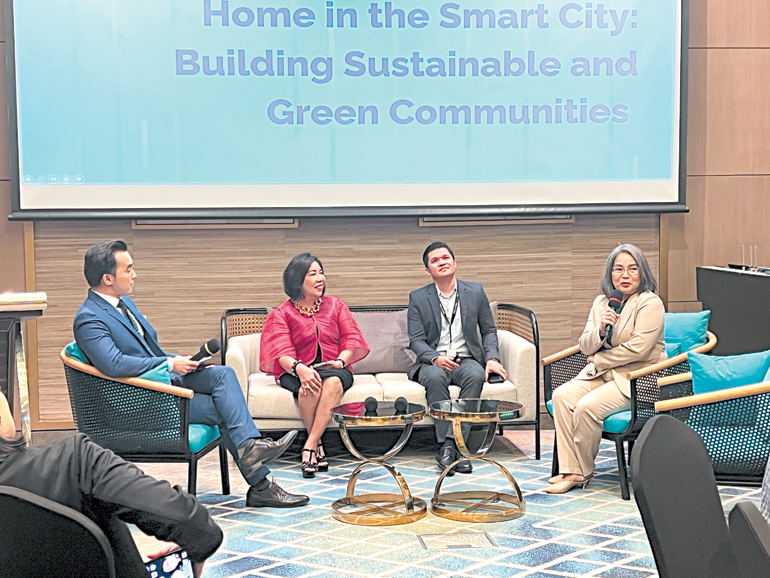
Smart cities also serve as home to citizens. And their housing could also keep pace with the innovative and sustainable developments in their cities, from the construction materials, design, and things that make up the homes in a city.
“Having sustainable material and design is very much part of a smart city,” said Jennifer H. Latoga, general manager at AAC Lightweight Block Corp., during the panel discussion on “Home in the Smart City: Building Sustainable and Green Communities.”
Smart homes, for Ms. Latoga, start with green materials.
Environmental consciousness among consumers has also risen during the pandemic, thus considering the environmental impact of products they purchase for their homes, according to Rosemarie B. Ong, senior executive vice-president and chief operating officer of Wilcon Depot, Inc.
“We believe that technology and automation hold a significant role in improving the lives of everyone. And we believe also that having sustainable products available can help improve the quality of life,” said Ms. Ong.
Accessibility is also important for smart homes, for Ms. Ong. As such homes are all about controlling and powered by the Internet.
And with smart and sustainable objects being placed in their houses, smart homes are supposed to improve the lives of people residing there. “Having a smart home is not just to live there, but you have to enjoy [living there] as well,” Ms. Ong said.
Some of the benefits she also saw for residents in smart homes include enhancing their convenience, energy efficiency, and security.
“Let’s all be smart in our choices and practices so that we can create smart communities and smart homes,” Ms. Ong reminded.
Focusing on home design, Stephen Rhey Ralota, director and project manager at the Cebu Office of Palafox Architecture Group, Inc. addressed the issue of merely copying designs from the Internet or magazines without considering the climate of the area.
“Sometimes, they just tend to copy and then the topography of the property is not applicable. So that’s where the connection comes in,” he added.
Smart cities, as further elaborated by Mr. Ralota, are “meant to permit citizens who make important choices to their environment in order to make everyday life more efficient and less stressful.” He presented the components of smart cities, which involve smart governance, economy, living, people, mobility, environment, and connectivity.
While Mr. Ralota acknowledged the “smart move” of Cebu with the bus rapid transit system, he looked to the digitalization of traffic management in the place.
Mobility in smart city
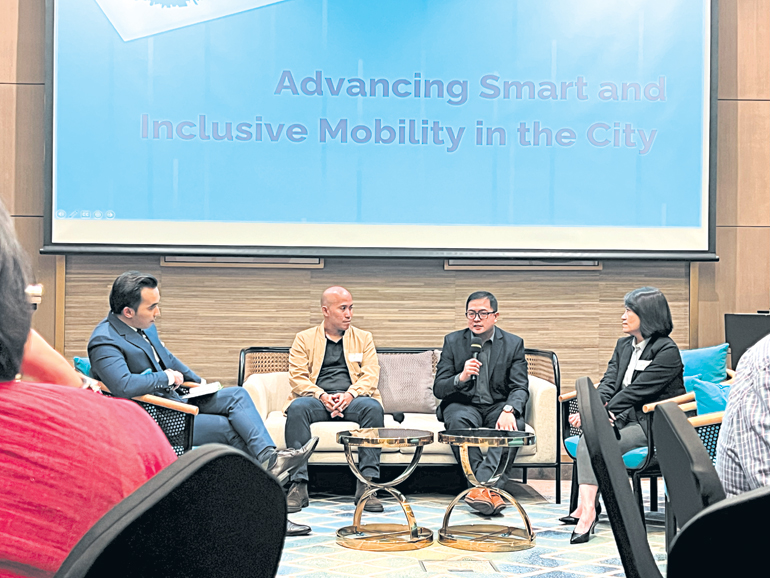
In supporting citizens to move around smart cities, mobility would also need to be sustainable and inclusive.
One of the ways to make transport sustainable is electrification. “We believe electrification is the future of transportation,” said Neil Stephen Lopez, assistant executive director at the Electric Vehicles Association of the Philippines, in the panel discussion on “Advancing Smart and Inclusive Mobility in the City.”
At the same time, Mr. Lopez noted the importance of transport accessibility in underserved areas.
“If we will be developing smart cities, one of the opportunities is to improve the accessibility of transport to underserved areas,” he said.
“Mobility is not a luxury; it’s a basic need. With the advent of technology, I hope we get to improve accessibility, make transportation affordable, make electric vehicles cheaper, and give good quality public transportation,” he added.
Meanwhile, Benedict L. Camara, director and founder of the National Bicycle Organization, further promoted active mobility, particularly the use of bicycles as transport.
“[I’m] hoping the government will make more policies to promote or support [active mobility], he said. “It starts with a simple policy. It doesn’t have to be big, but from there it can branch out.”
Mr. Camara further promoted active mobility by recommending businesses set up private bike shares and bike parking.
Ride sharing is also highlighted by Ma. Cristina Fe N. Arevalo, CEO of Toyota Mobility Solutions Philippines, Inc.
“[A] ride doesn’t have to be exclusive, it can be shared. But we have to address the safety and security issues,” she said. “And that will, I think, contribute to having a smart city and achieve more carbon neutrality and a sustainable society.”
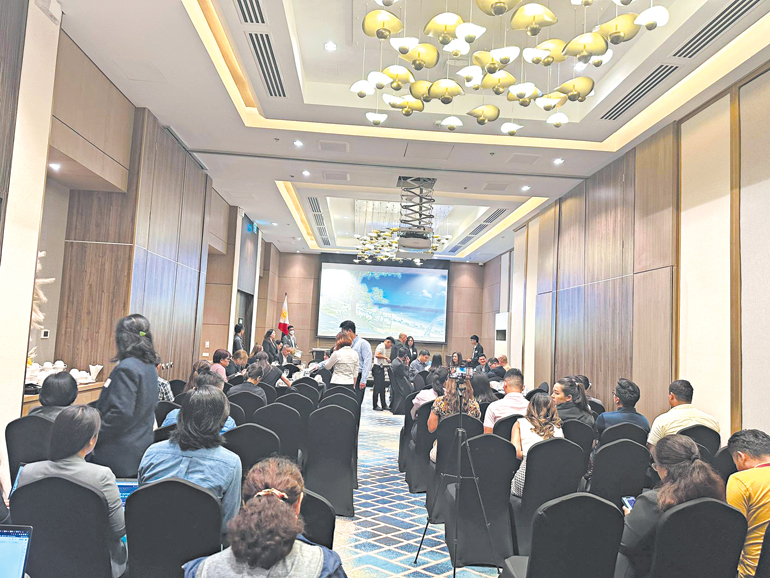
“A Blueprint for Philippine Smart Cities” was presented by BusinessWorld Publishing Corp. and The Freeman, in partnership with AboitizPower and Wilcon Depot; with the support of GCash, Energy Development Corp., Aboitiz InfraCapital Economic Estates, CCLEX Corp., and Primeworld Land Holdings, Inc.; and was sponsored by AppleOne Properties, Inc.; Meralco PowerGen Corp., Global Business Power Corp., Primary Homes Inc., Sto. Niño Mactan College School of Law, SM Supermalls, and Visayan Electric Company; with media partner The Philippine STAR.



